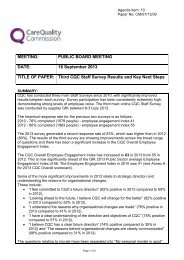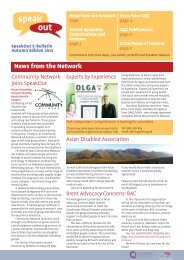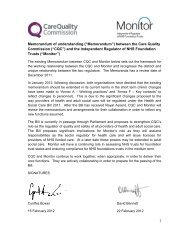Whistleblowing: Guidance for providers who are registered with CQC
Whistleblowing: Guidance for providers who are registered with CQC
Whistleblowing: Guidance for providers who are registered with CQC
Create successful ePaper yourself
Turn your PDF publications into a flip-book with our unique Google optimized e-Paper software.
Annex:<br />
The Public Interest Disclosure Act 1998<br />
The Public Interest Disclosure Act 1998 (PIDA) offers protection to workers from any detriment<br />
from their employer that arises from the worker making a ‘protected disclosure’.<br />
To qualify as a ‘protected disclosure’ the disclosure must satisfy a number of requirements<br />
under PIDA:<br />
1. The worker must have made a ‘qualifying disclosure’. This is a disclosure of in<strong>for</strong>mation<br />
which, in the reasonable belief of the worker, tends to show one or more of the following:<br />
a) That a criminal offence has been committed, is being committed, or is likely to be<br />
committed.<br />
b) That a person has failed, is failing, or is likely to fail to comply <strong>with</strong> any legal obligation<br />
to which he is subject.<br />
c) That a miscarriage of justice has occurred, is occurring, or is likely to occur.<br />
d) That the health and safety of any individual has been, is being, or is likely to be<br />
endangered.<br />
e) That the environment has been, is being, or is likely to be damaged.<br />
f) That in<strong>for</strong>mation tending to show any matter falling <strong>with</strong>in any of the preceding<br />
paragraphs has been, or is likely to be deliberately concealed.<br />
A disclosure of in<strong>for</strong>mation is not a qualifying disclosure if the person making it commits a<br />
criminal offence in doing so.<br />
2. The qualifying disclosure must be made in good faith.<br />
3. The worker must make the qualifying disclosure to one of a number of ‘specified persons’ set<br />
out in PIDA, which include:<br />
a) The worker's employer or, if they reasonably believe that the failure relates solely or<br />
mainly to (i) the conduct of a person other than their employer or (ii) any other matter<br />
<strong>for</strong> which a person other than their employer has legal responsibility, that other person.<br />
b) A 'prescribed person', which includes <strong>CQC</strong>. However, the worker must reasonably<br />
believe that the in<strong>for</strong>mation disclosed and any allegation contained in it is substantially<br />
true. The worker must also reasonably believe that the relevant failure being disclosed<br />
falls <strong>with</strong>in any description of matters <strong>for</strong> which <strong>CQC</strong> is a prescribed person.<br />
Where the above requirements <strong>are</strong> satisfied, a worker <strong>who</strong> has made a protected disclosure is<br />
protected under PIDA from dismissal or any other detriment arising from making that disclosure.<br />
Detriment can include detriment suffered from a previous employer where, <strong>for</strong> example, the<br />
employer refuses to give a reference because the worker has made a protected disclosure. A<br />
worker <strong>who</strong> suffers dismissal or detriment may bring a claim <strong>for</strong> compensation (which is<br />
unlimited) in the Employment Tribunal. The term ‘worker’ includes employees, contractors or<br />
self-employed people.<br />
PoC 100495 2.00 <strong>Whistleblowing</strong>: <strong>Guidance</strong> <strong>for</strong> <strong>providers</strong><br />
<strong>who</strong> <strong>are</strong> <strong>registered</strong> <strong>with</strong> the C<strong>are</strong> Quality Commission 10

















